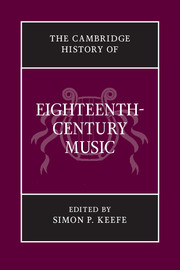Book contents
- Frontmatter
- PRELUDE
- PART I MUSIC FOR THE CHURCH
- INTERLUDE
- PART II MUSIC FOR THE THEATRE
- 8 Italian opera in the eighteenth century
- 9 Opera in Paris from Campra to Rameau
- 10 An instinct for parody and a spirit for revolution: Parisian opera, 1752–1800
- 11 German opera from Reinhard Keiser to Peter Winter
- 12 The lure of aria, procession and spectacle: opera in eighteenth-century London
- 13 Music theatre in Spain
- 14 Opera in Sweden
- INTERLUDE
- PART III MUSIC FOR THE SALON AND CONCERT ROOM
- POSTLUDE
- Appendix I Chronology
- Appendix II Institutions in major European cities
- Appendix III Personalia
- Index
- References
10 - An instinct for parody and a spirit for revolution: Parisian opera, 1752–1800
from PART II - MUSIC FOR THE THEATRE
Published online by Cambridge University Press: 28 March 2011
- Frontmatter
- PRELUDE
- PART I MUSIC FOR THE CHURCH
- INTERLUDE
- PART II MUSIC FOR THE THEATRE
- 8 Italian opera in the eighteenth century
- 9 Opera in Paris from Campra to Rameau
- 10 An instinct for parody and a spirit for revolution: Parisian opera, 1752–1800
- 11 German opera from Reinhard Keiser to Peter Winter
- 12 The lure of aria, procession and spectacle: opera in eighteenth-century London
- 13 Music theatre in Spain
- 14 Opera in Sweden
- INTERLUDE
- PART III MUSIC FOR THE SALON AND CONCERT ROOM
- POSTLUDE
- Appendix I Chronology
- Appendix II Institutions in major European cities
- Appendix III Personalia
- Index
- References
Summary
This chapter first explains why ‘revolution’ is a central term for understanding French operatic culture in the period under investigation. It is historically organized and divided into four sections. The first deals with attempts to bring Italian opera to Paris in the 1750s. The second describes the vicissitudes at two theatres – the Comédie-Italienne and the Opéra-Comique – to establish French opera for a bourgeois and lower-middle-class audience. In the third section we follow the career of Christoph Willibald Gluck from Viennese to Parisian composer in the context of theatrical rivalries and in the final section observe the uncertainties that befell French opera in the Revolutionary period.
Using ‘revolution’ as the central concept for understanding Parisian opera in the second half of the eighteenth century might be regarded as either banal or far-fetched. For although the events of 1789 that have shaped our concept of ‘revolution’ took place within the time-frame of our topic, the question of whether music was one of the causes of those political events, or whether the events in turn brought about a simultaneous revolution in music, remains a subject of debate. Certainly, historic upheavals of such magnitude do not happen overnight, nor could the participants instantly channel the collective energy that overpowered the Bastille on 14 July 1789 into a sustainable ‘volonté générale’, to use Rousseau’s phrase.
- Type
- Chapter
- Information
- The Cambridge History of Eighteenth-Century Music , pp. 295 - 330Publisher: Cambridge University PressPrint publication year: 2009
References
- 1
- Cited by

